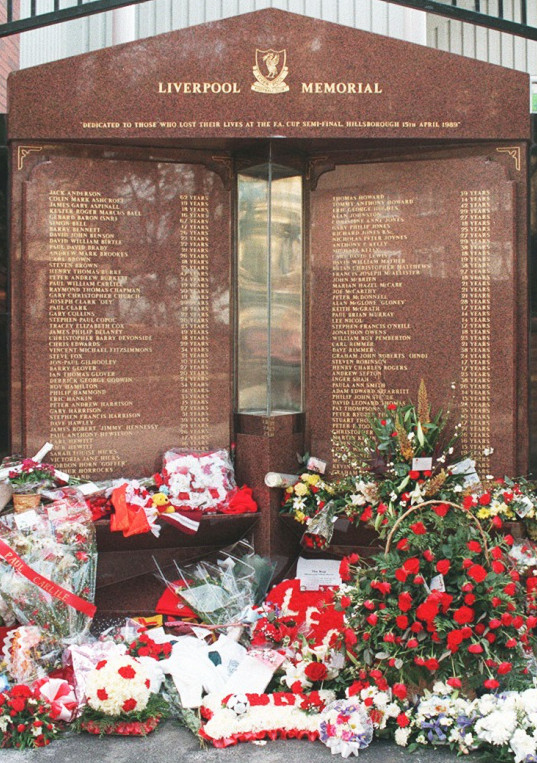- Hillsborough – Letter from the Director of Public Prosecutions, May 6th 2016: Susan Hemming to take final decisions: and reply:
- 060516 Letter to The Lord Alton of Liverpool
Dear Mr.Okogwu
I would be grateful if you would thank the Director for this response.
I do find it astonishing that it will not be possible to decide more quickly – and certainly well before the end of the year.
I would have assumed you would have been receiving transcripts of the Inquest throughout the proceedings and would have been assessing them continually – particularly given the potential for some prosecution questions and the need for requisite decisions.
Given the extraordinary delays which have blighted the lives of the affected families for nearly three decades I would be grateful if you would convey my further request to expedite the decisions which must be taken.
Could you also indicate whether there is any linkage to the work of the continuing Hillsborough Inquiry and whether you will be asking the Inquiry team for sight of their preliminary findings and conclusions before arriving at your own decisions about how best to proceed.
Yours sincerely,
David Alton
(Lord Alton of Liverpool),
Professor of Citizenship, Liverpool John Moores University,
Independent Crossbench Member of the House of Lords.
www.davidalton.net [email protected]
0151 231 3852 (University); 0207 219 3551 (Parliament)
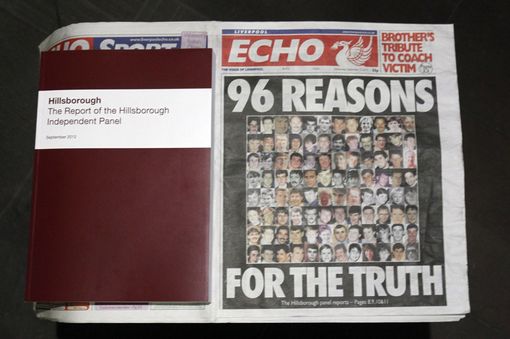
- http://www.publications.parliament.uk/pa/cm198889/cmhansrd/1989-04-17/Debate-1.htmlColumn 33: House of Commons April 17th 1989 Mr. David Alton (Liverpool, Mossley Hill) : In the face of this terrible and wholly avoidable tragedy–many of the fatalities were young children, including a 13-year-old boy from my
constituency–expressions of condolences and sympathy seem inadequate to sum up the enormity of it for a city that is mourning its dead and is united in its grief.
A time will come when grief will give way to anger and questions will have to be answered. I should like an assurance from the Home Secretary that it will be made clear why the gate was opened and who took that decision. Why were emergency arrangements so pitifully inadequate? I welcome what the right hon. Gentleman said about the provision of seats in our national stadiums, but will he take urgent action to ensure that those terrible metal cages are put on the scrap heap and people are treated like human beings instead of animals? On 22 March, I wrote to the Minister about the ticket allocation for Saturday’s match. I enclosed a statement from Mr. Peter Robinson, the chief executive of Liverpool football ground, who said : “I made it plain that there was no way I could support the choice of Hillsborough this year with the same ticket allocations applying.”
When I received a reply dated 11 April from the Minister of Sport, he said that the mater was entirely for the football authorities. In the light of what has happened, will the Home Secretary accept that the Minister should take an interest in this matter? Will he confirm that which the Minister said, that the allocations were made on the basis of police advice? I ask that because there have been conflicting statements in the past 24 hours.
Liverpool is a city schooled in adversity. However, not since the blitz has it had to face a tragedy on such a shocking scale. I am sure that the House today will wish to express its solidarity with those who grieve and those awaiting news of loved ones, whose lives still lie in the balance.
Mr. Hurd : All the points raised by the hon. Gentleman are clearly covered by the terms of reference of the inquiry, and Lord Justice Taylor will be able to look into them. I am slightly surprised that he suggests that Ministers should become involved in deciding, match by match, how tickets should be allocated. He is perfectly right in his understanding– these are matters for the football authorities. They consult on them and are guided by the police. I shall repeat my earlier point that, although the matter of total allocation will certainly be looked into, it was not the total allocation, so much as the concentration of that allocation in a part of the Liverpool terrace, which resulted in the terrible damage.
- ———————————————————————-
- Hillsborough Statement, House of Lords, April 27th 2016
- Lord Alton of Liverpool (CB)
- My Lords, during the 27 years that have elapsed since the Hillsborough disaster, the double spectre of loss and injustice has hung over the people of Liverpool. Among the 96 who died were former constituents of mine, including a child. Those deaths of loved ones were compounded by the denial of criminal negligence, callous indifference, the subversion of our justice system, collective character assassination and demonisation. If the Minister has had a chance to read the material I sent him this morning, including the letter I sent before the game was played at Hillsborough which questioned the safety of the ground, he will realise that there are still many unanswered questions. I would be grateful if he told us more about the timetabling of the continuing inquiry, which is being held with great diligence and meticulousness at Warrington; I have had a chance to visit it and talk to the people about the way they are going about their work. Will he also answer the question which the noble Viscount, Lord Hailsham, put to him a few moments ago about the further judicial proceedings that will be necessary and the timetabling for decisions? We certainly cannot wait another three decades.
- Lord Ahmad of Wimbledon
- To take the noble Lord’s last question first, it would certainly be inappropriate for me to straitjacket the CPS in any respect, but the CPS, the two ongoing inquiries and everyone involved in them are fully aware of the sensitive nature of this issue. As we said, there is a responsibility on all involved in these inquiries to make sure that we reach a decision which ensures that justice prevails as soon as is possible and practicable, but it is very much for the CPS to lead on this. I confess that I have not had time to reflect on the detail of the information the noble Lord sent to me this morning, but I certainly will, and look forward to discussing it with him.
————————————————————————–
April 26th 2016: Ninety-six football fans who died as a result of a crush in the 1989 Hillsborough disaster were unlawfully killed, the inquests have concluded.
http://www.bbc.co.uk/news/uk-england-36138337
The jury decided the match commander Ch Supt David Duckenfield’s actions amounted to “gross negligence” due to a breach of his duty of care to fans.
Police errors also added to a dangerous situation at the FA Cup semi-final.
After a 27-year campaign by victims’ families, the behaviour of Liverpool fans was exonerated.
The jury found they did not contribute to the danger unfolding at the turnstiles at the Leppings Lane end of Sheffield Wednesday’s ground on 15 April 1989.
The jury also concluded
- Police errors caused a dangerous situation at the turnstiles
- Failures by commanding officers caused a crush on the terraces
- There were mistakes in the police control box over the order to open the Leppings Lane end exit gates
- Defects at the stadium contributed to the disaster
- There was an error in the safety certification of the Hillsborough stadium
- South Yorkshire Police and South Yorkshire Ambulance Service delayed declaring a major incident
- The emergency response was therefore delayed
- Sheffield Wednesday failed to approve the plans for dedicated turnstiles for each pen
- There was inadequate signage at the club and misleading information on match tickets
….
A statement on behalf of the families said the jury’s conclusions “completely vindicate” the long fight for justice.
…
The police response to the increasing crowd outside the Leppings Lane turnstiles at Liverpool’s match against Nottingham Forest was “slow and uncoordinated”, the inquests heard.
The road closure “exacerbated” the situation and there were no filter cordons in place to regulate the movement of spectators.
Attempts to close the perimeter gates were made too late and there were no contingency plans for the “sudden arrival” of a large number of fans, the jury said.
Jurors concluded the commanding officers should have ordered the closing of the tunnel which led directly to the central pens where the fatal crush occurred.
————————————————————————–
See:
https://www.davidalton.net/2015/05/05/two-columns-from-1989-following-the-hillsborough-disaster/
During a meeting this week, with members of the Hillsborough Independent Panel – http://hillsborough.independent.gov.uk/ – which was established by the Prime Minister in 2012 , we spent a lot of our time discussing a letter which I had sent to Ministers prior to the match being played and which raised safety concerns about the ground. The Panel also reminded me about – and showed me copies of the correspondence – which passed between me and the Chairman of the Police Complaints Authority in the days which followed the April 15th, 1989, tragedy at Hillsborough: a day which claimed 96 lives and remains the most serious tragedy in UK sporting history. The Independent Panel are painstakingly sifting through everything relating to Hillsborough, and deserve our admiration and thanks, but at this distance they have an almost impossible task – a task which should have been undertaken in the same objective and thorough manner twenty five years ago.
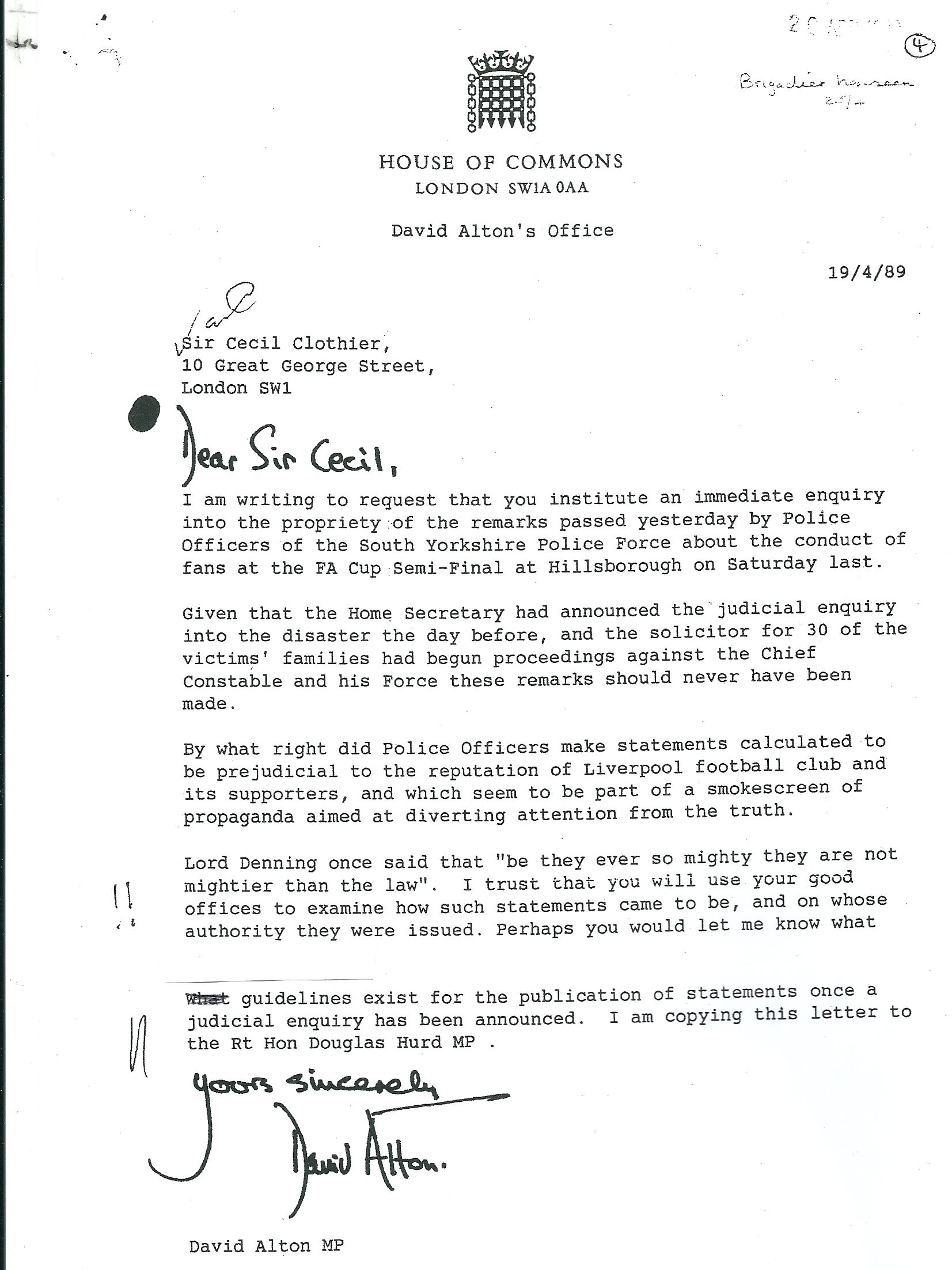
Letter to Sir Cecil Clothier, Chairman of the Police Complaints Authority, four days after the Hillsborough Disaster, asking for him to open an independent Inquiry into attempts by Police spokesmen to blame the fans for their own deaths.
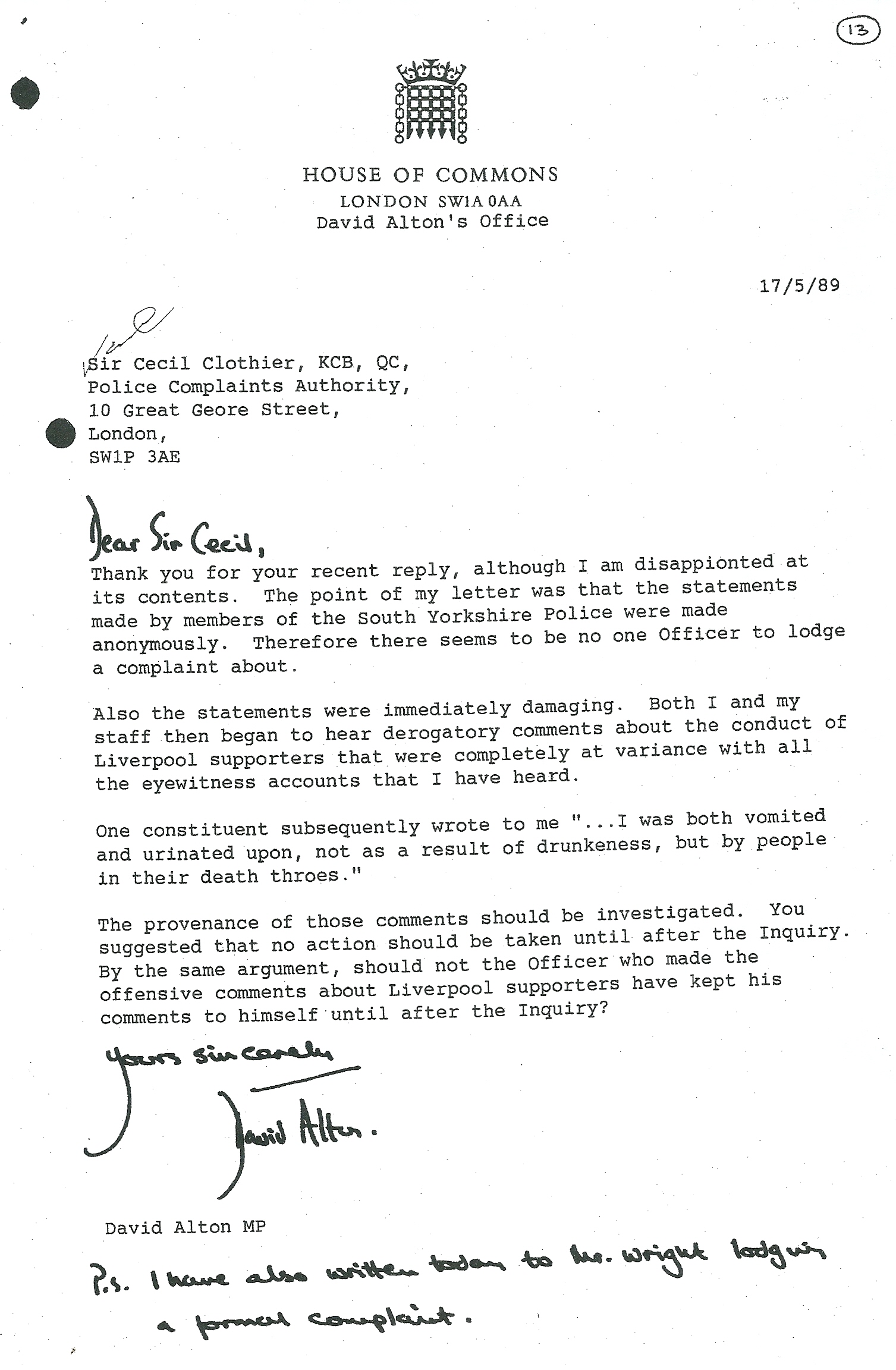
Letter to Sir Cecil Clothier, Chairman of the Police Complaints Authority, on May 17th,1989, contesting the Authority’s failure to mount an investigation
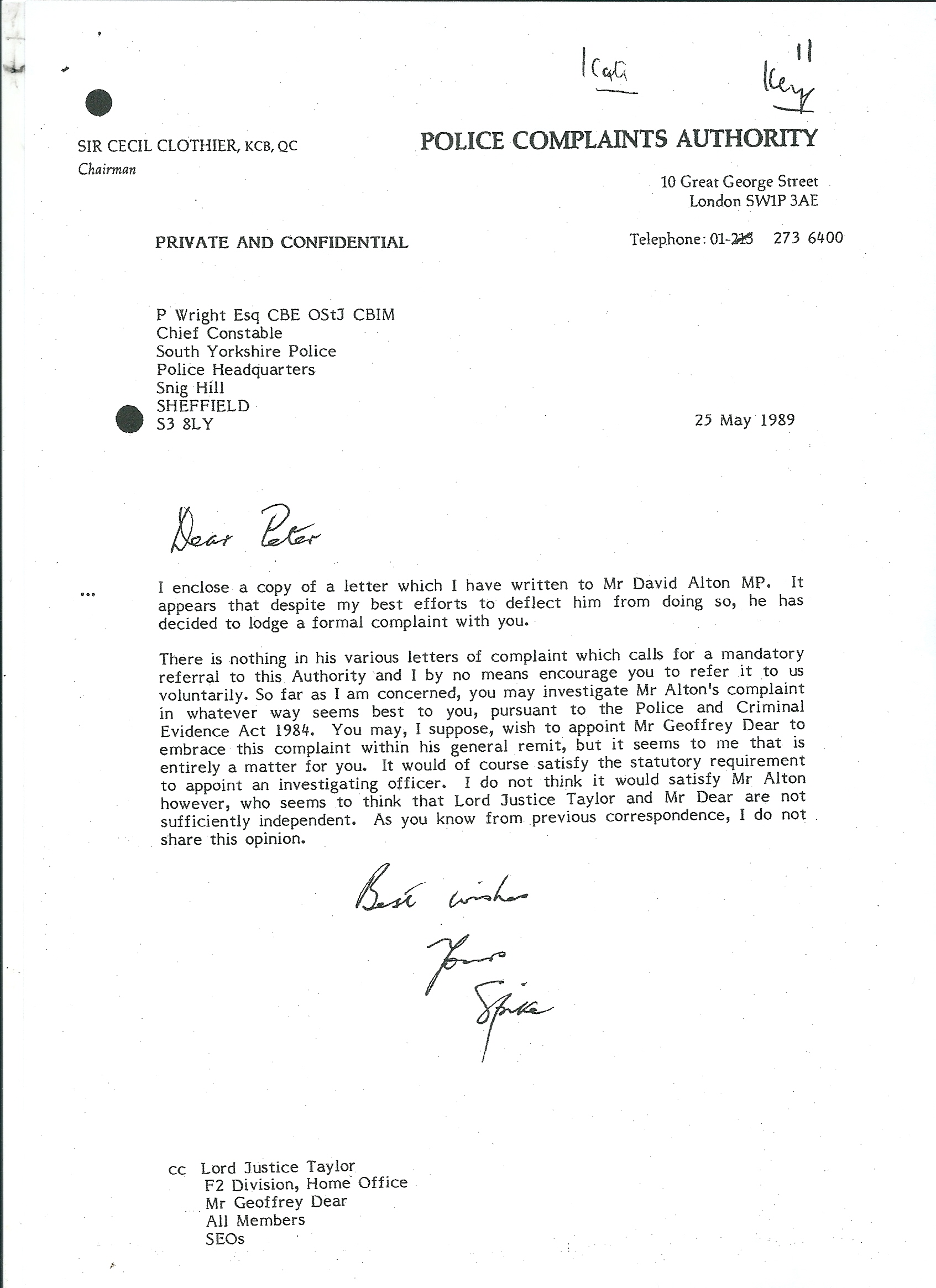
Letter from the Chairman of the Police Complaints Authority to the Chief Constable of South Yorkshire saying he had done his best to “deflect” my complaint. Sir Cecil signs the letter “Spike” – perhaps appropriately as it’s a word used by journalists when an editor has decided to withhold a story from publication.
Hillsoborough Correspondence DA
Moynihan reply to DA & cutting
In the aftermath of the Hillsborough Disaster, I had a protracted correspondence with the Police Complaints Authority, challenging the remarks which had been made by Police Officers and repeated in mass circulation newspapers and the media that Liverpool Football Club fans were responsible for their own deaths and injuries. I called for an Independent Inquiry. The correspondence has been published by the Hillsborough Independent Review (at http://hillsborough.independent.gov.uk/repository/docs/HOM000021980001.pdf) and it makes for deeply depressing reading.
Among the letters which were sent to me and which went to Sir Cecil Clothier, the Chairman of the Police Complaints Authority, was one from a constituent who was on the Leppings Lane Terrace and who provided a first-hand account of what he saw and experienced.
The letter is dated April 19th 1989, just four days after the tragedy. He vividly describes what occurred and focuses on the description of events given by police officers to the media, saying those responsible “should be prosecuted for the hurt, distress and wounding caused on Merseyside by his untrue, insensitive, unproven slanderous remarks…”
In my own letter to Sir Cecil, also dated April 19th, 1989, I asked him to “institute an immediate enquiry into the propriety of the remarks passed yesterday by Police Officers of the South Yorkshire Police Force” and that as the remarks had been made the day after the Home Secretary announced the judicial enquiry and “the solicitor for 30 of the victims’ families had begun proceedings against the Chief Constable and his Force these remarks should never have been made.”
I asked ”By what right did Police Officers make statements calculated to be prejudicial to the reputation of Liverpool Football Club and its supporters, and which seem to be part of a smokescreen of propaganda aimed at diverting attention from the truth.”
Quoting Lord Denning I reminded him that “Be they ever so mighty they are not mightier than the law” and I asked him to establish “how such statements came to be made and on whose authority they were issued.” I copied the letter to the Home Secretary, Douglas Hurd, and asked what guidelines existed for the publication of statements once a judicial inquiry had been announced.
In my next letter to Sir Cecil, five days later, on April 24th I asked his Police Complaints Authority to examine the conduct of the South Yorkshire Police – independently of the Government-established Inquiry by Lord Justice Taylor and the Police Inquiry to be led by the West Midlands Police Force because “you will be regarded as independent of Government and Constabulary, both of whom are clearly involved in having taken crucial decisions, which led to the horrific events at Sheffield.”
Sir Cecil wrote back on the 3rd of May refusing to conduct an investigation and stated that “ I must say at once there is not the slightest ground for suggesting that an enquiry conducted under the authority of Lord justice Taylor will be other than the most rigorous and independent character.” He suggested that the complainant would be better off “offering himself as a witness to Lord Justice Taylor’s enquiry, rather than by invoking the complaints procedure which is principally concerned with police discipline.”
The previous day, May 2nd, Sir Cecil wrote to me setting out the procedures for making a complaint and said “I am not sure whether you are making a formal complaint as a member of the public affected by the happenings at Hillsborough or as a Member of Parliament.”
He told me that if it was the latter I should raise my concerns in Parliament.
I replied on May 8th stating that my complaint was made “as a citizen of Liverpool” who was “deeply aggrieved that these comments were made when two Inquiries had already been established, rendering their comments sub-judice.”
I told him that “Their remarks were prejudiced, contrary to good police practice, insensitive to relatives and damaging to my city. I therefore trust you will feel able to carry out an investigation as to how this could have come about.”
On the 16th of May Sir Cecil once again set out the procedures under the Police and Criminal Evidence Act, 1984, and told me “I believe it would be better by far to await the findings of Lord justice Taylor’s inquiry before lodging a complaint about controversial statements by a police officer.”
On the 17th of May I responded that if no action should be taken until after the Inquiry “by the same argument should not the officer who made the offensive comments about Liverpool supporters have kept his comments to himself until after the Inquiry?”
I asked for him to investigate the South Yorkshire Force because, as the statements had been made anonymously, “there was no one officer to lodge a complaint about.” I told Sir Cecil that I had that day written to Peter Wright, the Chief Constable, lodging a formal complaint.
Among the letters which the Hillsborough Independent Review have also published is one sent on May 25th by Sir Cecil to Chief constable Peter Wright in which he encloses my own letters to him and referring to me he says “It appears that despite my best efforts to deflect him from doing so, he has decided to lodge a formal complaint with you.”
He tells him that he could “satisfy the statutory requirements“if he were simply to “appoint an investigating officer.” He adds that “I do not think it would satisfy Mr. Alton however, who seems to think that Lord Justice Taylor and Mr. Dear are not sufficiently independent.” Signing his letter with his nickname, Spike, Sir Cecil Clothier copied this note to Lord Justice Taylor and Mr. Dear.
In that respect he was, of course, right, I was not satisfied – and, more importantly, nor were the families who wanted justice and truth; and twenty five years later they remain convinced that they were lied to and subject to collective character assassination.
Not as a citizen of Liverpool but as one of its MPs, I had, of course, also been raising the issue in Parliament but had met the same brick walls and prevarication.
Ministers said what had occurred at Hillsborough was a matter for the Chief Constable and for the Taylor Inquiry. In the House of Commons, on April 24th 1989, I asked “at what level the publication of statements on 18 April by South Yorkshire police concerning the conduct of Liverpool fans at the Hillsborough semi-cup final was authorised; if he will publish a copy of that statement and the name of the officer who made it; and if he will make a statement”.
The Minister of State at the Home Office, Douglas Hogg, replied:
“Statements made by officers of the South Yorkshire police are a matter for the chief constable. It would not be helpful for me to publish statements or counter-statements which have been made about the circumstances leading to the tragedy, or to name those who made them. It is for Lord Justice Taylor’s inquiry to establish the facts”.-[Official Report, Commons, 24/4/89; col. 404.]
In the years which followed, I asked why those facts had not been established, why evidence had disappeared, and, in 1998, I asked what account Jack Straw, then the Home Secretary, had taken “in deciding against a fresh inquiry into the Hillsborough tragedy, of missing video tapes, changed statements by police officers, conflicting medical evidence and complaints of lack of impartiality in the original coroner’s process and in the granting of immunity from prosecution to police officers upon taking early retirement”. Ministers told me there was “no new evidence.” In 2012 I set out the reasons why this was not so: https://www.davidalton.net/2012/12/16/bishop-of-liverpool-and-david-alton-speak-on-the-hillsborough-disaster/
More than two decades later the Prime Minister, David Cameron, in establishing the Hillsborough Independent Review, made it clear that he concurs.
Mr Cameron told Parliament that the Liverpool fans had “suffered a double injustice”, both in the “failure of the state to protect their loved ones and the indefensible wait to get to the truth”.
What the diligent and painstaking work of the Independent Review team is now attempting to lay bare are not only the errors and deceits which occurred on that bleak day in April 1989 but the wanton and seemingly systematic attempts to delay, to obfuscate, and to refuse to truthfully address the questions which families and witnesses have consistently put to the authorities.
From time immemorial it has always been a tactic of Governments to set up committees in the hope of sending a contentious issue into the long grass and, with the passage of time, and the deaths of many of those who took wrong decisions or failed to do their jobs properly, their hope is that the ensuing reports will simply gather dust.
G.K.Chesterton, writing about what passes for public accountability and parliamentary scrutiny, once mocked a self-serving process which relied on copious amounts of white-wash. In his “Autobiography: the case against corruption” he writes that “A parliamentary Commission was appointed and reported that everything was very nice; a Minority report was issued which reported that some things were not quite so nice; and political life (if you can call it life) went on as before.”
Those who are privileged to hold high office should understand that for those who died and for those who still bear the emotional scars of Hillsborough life didn’t go on “as before”. We must wish the Hillsborough Independent Panel well as they finally try to do what should have been done 25 years ago.
On April 29th 2016 a letter was sent to Alison Saunders, Director of the Crown Prosecution Service asking what the timetable and time scale will be in reaching decisions about what must happen next and whether she will be personally reviewing the findings of the Inquest.

